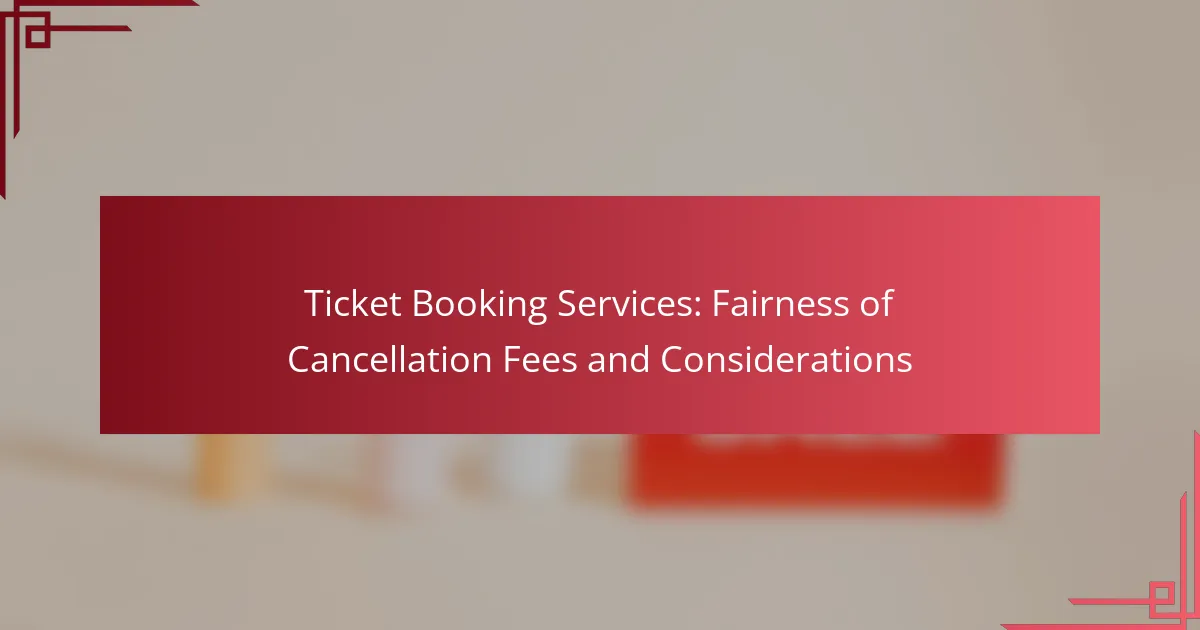When booking tickets, understanding cancellation fees is crucial for travelers looking to adjust their plans without facing hefty charges. Various services like Expedia, Booking.com, and Kayak offer different cancellation policies that can significantly impact the overall cost. By evaluating fare rules and refund policies, consumers can make informed decisions that enhance their travel experience and minimize unexpected expenses.

What are the best ticket booking services for fair cancellation fees?
Several ticket booking services offer fair cancellation fees, allowing travelers to adjust their plans without incurring excessive costs. Services like Expedia, Booking.com, and Kayak provide various cancellation policies that cater to different needs and preferences.
Expedia cancellation policies
Expedia generally offers flexible cancellation policies, especially for hotels and vacation packages. Many bookings allow cancellations up to 24 hours before check-in without a fee, while others may charge a small percentage of the total cost.
When booking through Expedia, look for options labeled as “Free Cancellation” to avoid unexpected charges. Always review the specific terms for each booking, as policies can vary significantly by provider and property.
Booking.com cancellation options
Booking.com provides a range of cancellation options, with many accommodations offering free cancellation up to a certain date. This flexibility is particularly beneficial for travelers who may need to change their plans last minute.
To ensure you choose a booking with favorable cancellation terms, use the filter options to display only properties that offer free cancellation. Be mindful of the deadlines, as missing them could result in a full charge.
Kayak ticket booking features
Kayak aggregates ticket options from various airlines and travel agencies, allowing users to compare cancellation policies easily. While Kayak itself does not set cancellation fees, it directs users to the policies of the airlines or agencies they choose.
When booking through Kayak, pay attention to the cancellation terms listed for each flight. Some airlines may offer flexible fares that allow changes or cancellations with minimal fees, while others may have stricter policies. Always check the details before finalizing your purchase.

How do cancellation fees vary by service?
Cancellation fees differ significantly across various ticket booking services, influenced by factors such as the type of service, the timing of the cancellation, and the specific policies of the provider. Understanding these variations can help travelers make informed decisions and potentially save money.
Airline cancellation fees comparison
Airlines typically impose cancellation fees that can range from low to high, depending on the fare class and timing. For instance, budget airlines may charge a flat fee, often between $50 and $200, while major carriers might have more flexible policies for higher fare classes, allowing free cancellations within a certain period.
It’s crucial to check the airline’s specific cancellation policy before booking. Some airlines offer travel insurance that can mitigate cancellation fees, making it worthwhile to consider this option if plans are uncertain.
Travel agency fee structures
Travel agencies often have their own cancellation fee structures, which can vary widely based on the agency and the services booked. Many agencies charge a service fee for cancellations, typically ranging from $25 to $100, in addition to any fees imposed by airlines or hotels.
When booking through a travel agency, clarify their cancellation policy upfront. Some agencies may offer more lenient cancellation terms, especially for package deals, which can be beneficial if plans change.
Online platform fee differences
Online ticket booking platforms generally have varying cancellation fees based on the provider and the type of ticket purchased. Some platforms may allow free cancellations within a specific timeframe, while others might charge fees that can range from $10 to $50.
Before finalizing a booking, review the cancellation terms on the online platform. Look for options that include flexible cancellation policies or the ability to purchase additional coverage to protect against unexpected changes.

What should consumers consider before booking tickets?
Before booking tickets, consumers should evaluate fare rules, refund policies, and customer service quality to avoid unexpected costs and complications. Understanding these factors can help ensure a smoother travel experience and protect against excessive cancellation fees.
Understanding fare rules
Fare rules dictate the terms and conditions associated with ticket purchases, including restrictions on changes and cancellations. Consumers should carefully read these rules before finalizing a booking, as they can vary significantly between airlines and ticket types.
For example, some low-cost carriers may offer non-refundable fares, while full-service airlines might provide more flexible options. Knowing whether a fare is refundable or changeable can save money and stress later on.
Evaluating refund policies
Refund policies outline the process and conditions under which a consumer can receive a refund for a canceled ticket. It’s essential to check if the ticket is eligible for a refund and what fees may apply.
Many airlines have a tiered refund structure, where the refund amount decreases as the departure date approaches. For instance, a ticket canceled several weeks in advance might incur a small fee, while last-minute cancellations could result in a total loss of the fare.
Assessing customer service quality
Customer service quality can greatly impact the experience of resolving issues related to ticket bookings. Look for airlines or ticket services with strong reputations for customer support, as this can make a difference when needing assistance with cancellations or changes.
Research online reviews and ratings to gauge customer satisfaction. A company with responsive support can help navigate the complexities of cancellations and refunds more effectively, reducing potential frustration during travel disruptions.

How can consumers minimize cancellation fees?
Consumers can minimize cancellation fees by understanding their booking options, utilizing travel insurance, and being mindful of cancellation timing. By strategically planning their bookings and cancellations, travelers can reduce or avoid these costs.
Using flexible booking options
Selecting flexible booking options is one of the most effective ways to minimize cancellation fees. Many airlines and hotels offer flexible rates that allow changes or cancellations without penalties, often for a slightly higher price. Look for terms like “free cancellation” or “flexible fare” when booking.
For example, a flexible airline ticket might allow changes up to 24 hours before departure without incurring fees, while a non-flexible ticket could result in charges that range from a small fee to the full ticket price. Always compare the cost of flexibility against potential cancellation scenarios.
Travel insurance benefits
Travel insurance can provide significant protection against cancellation fees, especially for unexpected events like illness or emergencies. Many policies cover cancellation costs, allowing travelers to recover expenses if they need to cancel their trip for a covered reason.
When purchasing travel insurance, read the policy carefully to understand what is covered and any exclusions. Some insurers offer “cancel for any reason” options, which can provide additional peace of mind, though these may come at a higher premium.
Timing of cancellations
The timing of cancellations plays a crucial role in minimizing fees. Most airlines and hotels have specific time frames within which cancellations can be made without penalty. For instance, cancelling a flight within 24 hours of booking may allow for a full refund, while cancelling closer to the departure date could incur significant fees.
As a general rule, aim to cancel as early as possible. If you need to change plans, doing so well in advance—ideally several weeks before your scheduled departure—can help avoid steep cancellation fees. Always check the specific cancellation policies of your provider to make informed decisions.

What are the legal aspects of cancellation fees?
Cancellation fees are charges imposed by ticket booking services when a customer cancels a purchase. Understanding the legal framework surrounding these fees is essential for consumers to ensure they are treated fairly and to know their rights.
Consumer protection laws
Consumer protection laws are designed to safeguard buyers from unfair practices, including excessive cancellation fees. In many jurisdictions, these laws require that cancellation policies be clearly disclosed at the time of purchase, allowing consumers to make informed decisions.
For example, in the United States, the Federal Trade Commission (FTC) enforces regulations that prevent misleading advertising and ensure transparency in cancellation policies. Consumers should review these policies carefully before completing a transaction to avoid unexpected charges.
State-specific regulations
State-specific regulations can vary significantly regarding cancellation fees, with some states imposing stricter rules than others. For instance, certain states may limit the amount that can be charged for cancellations or require a grace period for refunds.
In California, for example, consumers have the right to cancel certain contracts within a specified timeframe without incurring fees. It is crucial for consumers to familiarize themselves with their state’s laws to understand their rights and obligations when booking tickets.

How do cancellation fees impact travel decisions?
Cancellation fees significantly influence travel decisions by adding a financial risk to booking plans. Travelers often weigh these fees against their likelihood of needing to change or cancel their trips, which can affect their choice of service providers and travel dates.
Influence on booking behavior
High cancellation fees can deter travelers from booking certain flights or accommodations, leading them to seek options with more flexible policies. Many consumers prefer to book with airlines or hotels that offer free cancellations or lower fees, which can shift demand towards more customer-friendly services.
For example, a hotel charging a cancellation fee of 50% of the total booking amount may lead travelers to choose a competitor with a more lenient policy. This behavior reflects a broader trend where flexibility is prioritized, especially in uncertain times.
Effects on travel planning
Cancellation fees can complicate travel planning by forcing travelers to consider potential changes in their schedules. This may lead to more cautious planning, where individuals opt for refundable tickets or accommodations, even if they are slightly more expensive.
Travelers should assess their own likelihood of needing to change plans before booking. A good practice is to compare cancellation policies across different providers and factor these fees into the overall cost of travel. This approach helps avoid unexpected expenses and ensures a smoother travel experience.

What are emerging trends in ticket booking services?
Emerging trends in ticket booking services focus on enhancing user experience and flexibility. Innovations such as dynamic pricing, personalized offers, and increased transparency in cancellation policies are becoming more prevalent.
Rise of flexible travel options
The rise of flexible travel options allows consumers to modify or cancel their bookings with minimal penalties. Many airlines and travel agencies are now offering tickets that permit changes without hefty fees, catering to the growing demand for adaptability in travel plans.
For instance, some airlines provide fare classes that include free changes or cancellations, while others may charge a nominal fee. This flexibility is particularly beneficial for travelers whose plans may change due to unforeseen circumstances, such as work commitments or personal emergencies.
When booking, look for options labeled as “flexible” or “refundable.” Always read the terms and conditions carefully to understand the specific cancellation policies and fees associated with your ticket, as they can vary significantly between providers.
